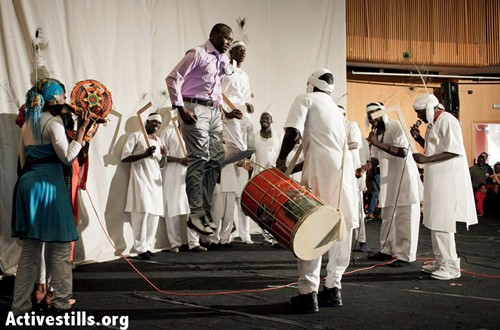
News that Israel has deported secretly more than 1,000 Sudanese migrants and refugees via a third country sparked an outcry Tuesday among human rights activists. MK Dov Khenin (Hadash) calling for them to be halted immediately. MK Khenin also asked Prime Minister Benjamin Netanyahu to investigate who ordered the repatriation in the first place.
Sudan defines Israel as an “enemy country” and has warned that it will punish any of its citizens who set foot here. Consequently, human rights groups said, the deportation constitutes a violation of Israel’s most basic obligations under international law. “The ease with which the State of Israel is willing to force people to return to a place where their lives are in danger, even if this danger arises only because they were in Israel, is worrying, and shows that we have become a society that sanctifies Jewish demography and gives it priority over humanistic Jewish values,” said Attorney Reut Michaeli, executive director of the Hotline for Migrant Workers.

Members of a dance group made up of Sudanese refugees from the Darfur region, dressed in traditional costume, dance on stage as part of day celebrating Sudanese culture, at a cultural centre in south Tel Aviv on February 15, 2013. Hundreds of Sudanese refugees took part, sharing examples of their cultural heritage with the local Israeli audience (Photo: Activestills)
While the state claims that all those deported left voluntarily, aid groups say the deportees were coerced by the threat that if they didn’t go, they could be jailed for years under a recent amendment to the Infiltration Law. Sudanese migrants “who hear from government representatives that the law enables them to be held in prison forever without trial, and without their being able to apply for refugee status, despair,” said Michaeli. “They are even willing to endanger their lives to gain a slim chance at freedom.”
Shahar Shoham, who heads the migrants department of Physicians for Human Rights, agreed that the deportees could not really be said to have acted out of their own free will. “At our open clinic, we treat many who report daily anxiety, fear of walking down the street and suicidal thoughts,” she said. “Is this free choice? And more than that, is this the treatment and protection we as a state give to victims of torture, human trafficking and persecution?”
Israel attempted to protect the deportees by deporting them via a third country to conceal the fact that they came from Israel, but the deportation took place without the knowledge or supervision of the UN High Commissioner for Refugees. “In deporting [people] to Sudan, Israel has crossed a red line and is not only violating its most basic obligation under international law, but demonstrating cruelty, hardheartedness and indifference to the fate of human beings,” Assaf, the Aid Organization for Refugees and Asylum Seekers, said in a statement. The UN has also stated that it estimates that around 400 Sudanese have been visited by Interior Ministry officials in detention centers in the South and advised that they can stay in prison or return to Sudan – an offer that the UN does not consider voluntary return.
Earlier this week Interior Minister Eli Yishai presented figures saying that around 1,000 Africans had “voluntary returned home,” a number the UN says they estimate to be rounded up. Yishai’s statement came days after Public Security Minister Yitzhak Aharonovitch said at the Knesset that dozens of African “infiltrators” are returning home to their countries willingly every week. Aharonovitch’s statement came in response to a question posed by Hadash MK Khenin, relating to reports of an Eritrean man beaten in south Tel Aviv and of police officers raiding migrant bars.
Related:
Israel accused of coercing Eritrean refugees to volunteer for deportation


